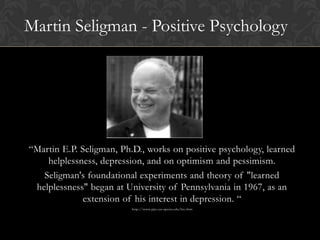
Positive Psychology In 5 Slides
- 1. Martin Seligman - Positive Psychology “Martin E.P. Seligman, Ph.D., works on positive psychology, learned helplessness, depression, and on optimism and pessimism. Seligman's foundational experiments and theory of "learned helplessness" began at University of Pennsylvania in 1967, as an extension of his interest in depression. “ http://www.ppc.sas.upenn.edu/bio.htm
- 2. MENTAL ILL HEALTH • “The DSM-IV is a categorical classification system. The categories are prototypes, and a patient with a close approximation to the prototype is said to have that disorder. • Diagnostic and Statistical Manual of Mental Disorders (DSM) is published by the American Psychiatric Association and provides a common language and standard criteria for the classification of mental disorders. • It is used in the United States of America and in varying degrees around the world, by clinicians, researchers, psychiatric drug regulation agencies, health insurance companies, pharmaceutical companies, and policy makers. • The DSM is a legitimating document and provides legal, medical, and ethical justification for physicians to diagnose and treat, judges to incarcerate and excuse, insurance companies to pay.” http://en.wikipedia.org/wiki/DSM-IV#DSM-IV_.281994.29
- 3. MENTAL WELL BEING & FLOURISHING “Seligman worked with Christopher Peterson to create what they describe as a 'positive' counterpart to the Diagnostic and Statistical Manual of Mental Disorders (DSM). While the DSM focuses on what can go wrong, Character Strengths and Virtues is designed to look at what can go right” http://en.wikipedia.org/wiki/Martin_Seligman
- 4. The practice of Positive Psychology “will make the world a happier place, in a way that parallels clinical psychologists having made the world a less unhappy place.” The reseearch of positive psychology has found that the good life consists of five elements: • P(ositive) emotion - tunable by writing down, every day at bed time, three things that went well, and why • E(ngagement) - tunable by preferentially using one's highest strengths to perform the tasks which one would perform anyway • R(elationships) - tunable, but not in a way that can be explained briefly • M(eaning) - belonging to and serving something bigger than one's self • A(chievement) - determination is known to count for more than IQ http://en.wikipedia.org/wiki/Martin_Seligman
- 5. LEARN MORE F i n d Yo u r S t r e n g t h s A p p l y Yo u r S t r e n g t h s http://www.authentichappiness.sas.upenn.edu http://www.actionforhappiness.org/media/52 /Default.aspx 486/340_ways_to_use_character_strengths.pd f